Did you know that choosing the right companion plants for your broccoli can make a world of difference in its success? Broccoli is a cool-weather crop that can be challenging to grow, but with the right companions, you can boost its growth, repel pests, attract beneficial insects, and even enhance its flavor. In this article, I will share my top picks for the best companion plants for broccoli and provide tips on how to choose the right companions for your broccoli garden.
Key Takeaways:
- Choosing the right companion plants for broccoli is crucial for its success.
- Companion plants can repel pests, attract beneficial insects, and provide shade and nutrients.
- Recommended companion plants for broccoli include lettuce, beets, dill, sweet alyssum, and calendula.
- Companion planting promotes a balanced and thriving garden ecosystem.
- Experimenting with different companion plants can help personalize your gardening approach.
The Importance of Companion Planting
Companion planting is a crucial practice when growing broccoli. By strategically selecting companion plants, you can enhance the health and productivity of your broccoli crop. This organic and sustainable gardening method promotes natural pest control, reduces the need for pesticides, and creates a harmonious garden ecosystem.
When it comes to companion planting with broccoli, there are three key benefits to consider: pest control, nutrient supply, and shade. By understanding and harnessing these benefits, you can create an optimal environment for your broccoli plants to thrive.
Pest Control
One of the main advantages of companion planting is its ability to attract beneficial insects that act as natural pest control agents. Planting specific companion plants alongside your broccoli can help repel pests and attract beneficial insects that prey on common broccoli pests.
For instance, the aromatic flowers of sweet alyssum and calendula can attract hoverflies, which feed on aphids and other harmful insects that can damage broccoli plants. Dill, on the other hand, attracts parasitic wasps that target cabbage worms.
By incorporating these companion plants into your broccoli garden, you can naturally reduce the presence of pests and minimize the need for chemical pesticides.
Nutrient Supply
Companion planting can also improve nutrient availability and uptake for your broccoli plants. Some companion plants have unique nutrient requirements or functions that benefit broccoli.
For example, planting beets alongside broccoli not only provides shade but also supplies calcium, a crucial nutrient for broccoli growth and development. Additionally, incorporating chamomile into your garden can improve soil fertility by increasing its nutrient content.
Moreover, certain plants, such as potatoes, have nutrient interactions that can benefit broccoli. Potatoes release magnesium and phosphate into the soil, which are essential nutrients for broccoli, while broccoli plants release nitrogen, benefiting neighboring potatoes.
By selecting companion plants that have complementary nutrient needs and interactions, you can enhance the overall nutrient availability and uptake for your broccoli plants.
Shade
Companion plants can also provide the much-needed shade for broccoli, which prefers cooler temperatures and partial shade during hot summer months.
Leafy greens like lettuce thrive in the shade created by the broccoli canopy. Interplanting lettuce with broccoli not only maximizes garden space but also creates a microclimate that helps regulate temperature and moisture levels. This shade also reduces weed growth as the lettuce covers the soil and competes with weeds for resources.
By utilizing companion plants for shade, you can create an optimal growing environment for your broccoli while minimizing weed competition.
Overall, companion planting is a valuable technique that promotes a thriving and well-balanced garden ecosystem. By harnessing the benefits of pest control, nutrient supply, and shade, you can create an organic and sustainable garden that supports the growth and productivity of your broccoli plants.
Experiment with various companion plants, observe their interactions, and tailor your companion planting strategy to suit the unique needs of your garden. With careful planning and implementation, you can enjoy a bountiful harvest of healthy and delicious broccoli.
| Companion Plant | Benefits |
|---|---|
| Sweet Alyssum | Attracts hoverflies that feed on aphids |
| Calendula | Attracts hoverflies that feed on aphids |
| Dill | Attracts parasitic wasps that prey on cabbage worms |
| Beets | Provides shade and supplies calcium |
| Chamomile | Improves soil fertility and nutrient content |
| Potatoes | Releases magnesium and phosphate when planted near broccoli |
| Lettuce | Provides shade and suppresses weeds |
Beneficial Insects
When it comes to pest control in your broccoli garden, companion plants can be your greatest ally. By attracting beneficial insects, these plants help keep common pests in check, reducing the need for chemical pesticides. Let’s take a closer look at some of the companion plants that attract beneficial insects and aid in pest control.
Plants that Attract Hoverflies
The presence of aphids in your broccoli garden can be a cause for concern. However, by planting companion plants like sweet alyssum and calendula, you can encourage the arrival of hoverflies. These lovely insects feed on aphids, effectively reducing their numbers and preventing them from damaging your broccoli plants.
| Companion Plant | Beneficial Insect Attracted |
|---|---|
| Sweet Alyssum | Hoverflies (feed on aphids) |
| Calendula | Hoverflies (feed on aphids) |
Plants that Attract Parasitic Wasps
Cabbage worms are a common pest that can wreak havoc on your broccoli plants. However, planting dill alongside your broccoli can help control these pests. Dill attracts parasitic wasps, which lay their eggs inside the cabbage worms. As the wasp larvae develop, they consume the cabbage worms from within, effectively reducing their population.
By incorporating these companion plants into your broccoli garden, you can create an environment that attracts beneficial insects and naturally controls the pests that threaten your crops. This organic and sustainable approach not only protects your broccoli plants but also promotes a healthier garden ecosystem.
Nutrient Enhancement
Certain companion plants can play a vital role in improving the growth and yield of broccoli. By strategically selecting companion plants that complement the nutrient needs of broccoli, you can enhance its overall health and productivity. Here are some companion plants that can help improve the nutrient availability and uptake for your broccoli garden:
Beets
Beets are an excellent companion plant for broccoli due to their low-nutrient-demanding nature. They can be planted alongside broccoli without competing for nutrients. Furthermore, beets provide calcium, which is beneficial for broccoli growth. By interplanting beets with broccoli, you can enhance the nutrient balance and improve the overall health of your broccoli plants.
Chamomile
Chamomile is another companion plant that can enhance the growth of broccoli. Like beets, chamomile has low nutrient demands and can coexist harmoniously with broccoli without depleting the soil of essential nutrients. Moreover, chamomile is known to attract beneficial insects, such as bees and hoverflies, which can aid in pollination and pest control in your broccoli garden.
Potatoes
Planting potatoes near broccoli can provide additional nutrients that benefit both plants. Potatoes are a good source of magnesium and phosphate, while broccoli benefits from calcium and nitrogen. This nutrient exchange can improve the growth and yield of both crops. However, it’s important to ensure that the potato plants do not shade the broccoli, as broccoli requires ample sunlight for optimal growth.
Companion Plant Nutrient Enhancement Table
| Companion Plants | Beneficial Nutrients |
|---|---|
| Beets | Calcium |
| Chamomile | Low nutrient demand |
| Potatoes | Magnesium and phosphate |
| Broccoli | Calcium and nitrogen |
This table summarizes the nutrient enhancement provided by different companion plants in a broccoli garden. By incorporating these companion plants, you can optimize the nutrient balance and improve the growth and yield of your broccoli plants.
Shade and Weed Suppression
Companion plants can play a crucial role in providing shade and suppressing weeds in a broccoli garden. When it comes to intercropping with broccoli, lettuce and other leafy greens are excellent choices. These plants not only thrive in the shade created by the broccoli plants but also help reduce weed growth by covering the soil and competing with weeds for resources. This dual benefit of shade provision and weed control makes them valuable companions for broccoli.
Intercropping with Broccoli: Lettuce as a Shade Provider
Lettuce is an ideal companion plant for broccoli due to its compact size and ability to grow in the shade. As the broccoli plants mature and develop a dense canopy, they create the perfect environment for lettuce to thrive. The lettuce plants benefit from the shade provided by the broccoli, which helps to keep the soil cool and retain moisture. Additionally, the dense foliage of the lettuce plants forms a natural weed barrier, minimizing weed competition and reducing the need for manual weeding.
Weed Suppression: Leafy Greens Competing with Weeds
Leafy greens, such as spinach, Swiss chard, and arugula, can also be effective companion plants for weed control in a broccoli garden. These leafy greens have vigorous growth habits and quickly fill in any gaps, leaving less space for weeds to establish themselves. By densely covering the soil surface, they not only reduce weed growth but also prevent weed seeds from germinating by blocking sunlight. Their ability to outcompete weeds for nutrients and water further contributes to weed suppression and helps maintain a clean and weed-free broccoli garden.
In summary, intercropping with broccoli provides an opportunity to maximize the space in your garden while utilizing companion plants that offer shade and weed suppression benefits. The combination of broccoli with lettuce and other leafy greens creates an ecosystem that promotes the growth of both crops while reducing weed competition and the need for manual weed control.
| Companion Plants | Benefits |
|---|---|
| Lettuce | Provides shade, retains moisture, and suppresses weeds |
| Spinach | Competes with weeds for resources and forms a natural weed barrier |
| Swiss Chard | Minimizes weed competition and creates a weed-free environment |
| Arugula | Reduces weed growth by covering the soil surface |
Flavor Enhancement
While there is no scientific evidence to support the claim, some gardeners believe that certain plants can improve the flavor of broccoli. Fragrant herbs like oregano and thyme are often mentioned as potential flavor enhancers. These herbs also have pest-repelling properties, which can benefit broccoli. Incorporating these herbs into your garden alongside broccoli can potentially enhance the flavor of your harvest.
If you’re looking to add depth and aroma to your broccoli dishes, consider planting oregano and thyme as companion plants. These herbs not only provide a delicious fragrance but also act as natural deterrents to pests that may attack your broccoli plants. By creating a diverse garden ecosystem with these flavorful companions, you can potentially elevate the taste of your homegrown broccoli.
While some gardeners have reported enhanced flavor when pairing broccoli with oregano and thyme, it’s important to note that taste preferences can vary. Experimenting with different companion plants can be a fun way to discover new flavors and aromas in your garden. So why not give these fragrant herbs a try and see if they make a difference in the flavor profile of your broccoli?
Plants to Avoid
When it comes to companion planting with broccoli, it’s important to know which plants to avoid. There are certain plants that can hinder the growth and development of broccoli or attract pests that also target this cruciferous vegetable. To ensure the success of your broccoli garden, it’s best to keep these plants separate from your broccoli plants. Here are the plants to avoid planting with broccoli:
| Plants to Avoid | Reason |
|---|---|
| Beans | Competition for nutrients |
| Nightshade plants (peppers and tomatoes) | Pests that target broccoli |
| Strawberries | Competition for space and nutrients |
| Other brassicas (cabbage and cauliflower) | Competition for nutrients and pests |
By avoiding these plants as companions for broccoli, you can create an optimal growing environment for your broccoli plants and maximize their potential yield.
Remember, selecting the right companion plants for broccoli is key to optimizing growth and avoiding potential issues. By avoiding the plants mentioned above and focusing on suitable companions, such as lettuce, beets, dill, sweet alyssum, and calendula, you can create a harmonious garden that benefits your broccoli plants and overall garden ecosystem.
Personal Experience and Lessons Learned
Throughout my journey of companion planting with broccoli, I have gained valuable insights and learned important lessons. One particular experience that stands out is the time I planted rhubarb close to my broccoli plants. At first, it seemed like a good idea, as both plants thrive in similar growing conditions. However, I soon realized that this decision had unintended consequences.
The rhubarb grew rapidly, overshadowing my broccoli plants and depriving them of the much-needed sunlight. As a result, the broccoli struggled to develop properly and yielded a smaller harvest. This taught me the importance of considering the growth habits and spacing requirements of both broccoli and its companion plants when planning the garden.
Another lesson I learned is the detrimental effect that overcrowding can have on companion plants. In my eagerness to maximize space, I sometimes neglected to give each plant enough room to grow. This led to competition for resources, stunted growth, and reduced yields. It is crucial to provide adequate spacing between plants to ensure their healthy development and productivity.
Through my personal experiences, I discovered that successful companion planting with broccoli requires careful and strategic planning. Understanding the specific needs and interactions between different plants helps in creating harmonious and fruitful garden beds.
Lessons Learned:
- Consider the growth habits and spacing requirements of companion plants.
- Avoid planting companion plants that may overshadow or outgrow the broccoli.
- Provide sufficient spacing to avoid competition for resources.
- Regularly monitor and adjust the placement of companion plants as needed.
| Lessons Learned | Key Takeaways |
|---|---|
| Consider the growth habits and spacing requirements of companion plants. | This ensures that companion plants do not overshadow or outgrow the broccoli, allowing each plant to receive adequate sunlight and space. |
| Avoid planting companion plants that may overshadow or outgrow the broccoli. | Planting tall or fast-growing companions close to broccoli can lead to shading issues and hinder the growth of the broccoli plants. |
| Provide sufficient spacing to avoid competition for resources. | Overcrowding can result in stunted growth and reduced yields. Give each plant enough room to thrive and access essential nutrients and water. |
| Regularly monitor and adjust the placement of companion plants as needed. | Keep a close eye on the growth and development of companion plants. If any issues arise, such as overcrowding or shading, make necessary adjustments to optimize the garden’s performance. |
By applying these lessons learned, I was able to fine-tune my companion planting strategies and optimize the growth and productivity of my broccoli garden. Learning from my experiences has been invaluable in creating a thriving and harmonious garden ecosystem.
Conclusion
Companion planting with broccoli offers a myriad of benefits for your garden. By selecting the right companion plants, such as lettuce, beets, dill, sweet alyssum, and calendula, you can create a thriving ecosystem that promotes the healthy growth of your broccoli plants.
With their pest-repelling properties and ability to attract beneficial insects, these companion plants contribute to natural pest control and reduce the need for harmful pesticides. Additionally, certain companion plants, like beets and chamomile, enhance nutrient availability and uptake, resulting in improved growth and yield for your broccoli.
By intercropping with shade-tolerant plants like lettuce and other leafy greens, you can create a beneficial microclimate that helps suppress weeds and maximize space utilization in your garden. Moreover, incorporating fragrant herbs like oregano and thyme alongside broccoli can potentially enhance the flavor of your harvest.
Personalizing your companion planting approach by experimenting with different combinations of companion plants will allow you to discover what works best for your garden. By fostering diversity and balance in your garden ecosystem, you can create a sustainable and thriving environment that maximizes the potential of your broccoli plants.

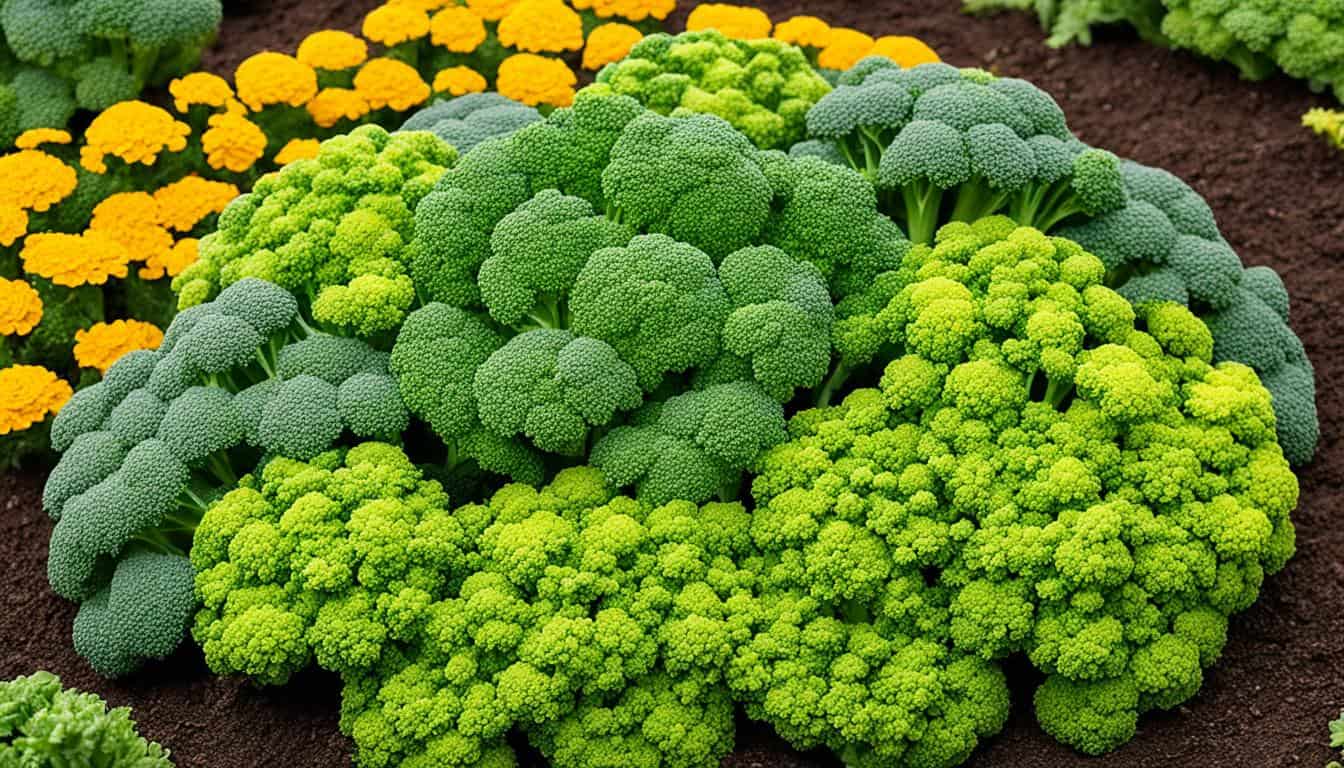
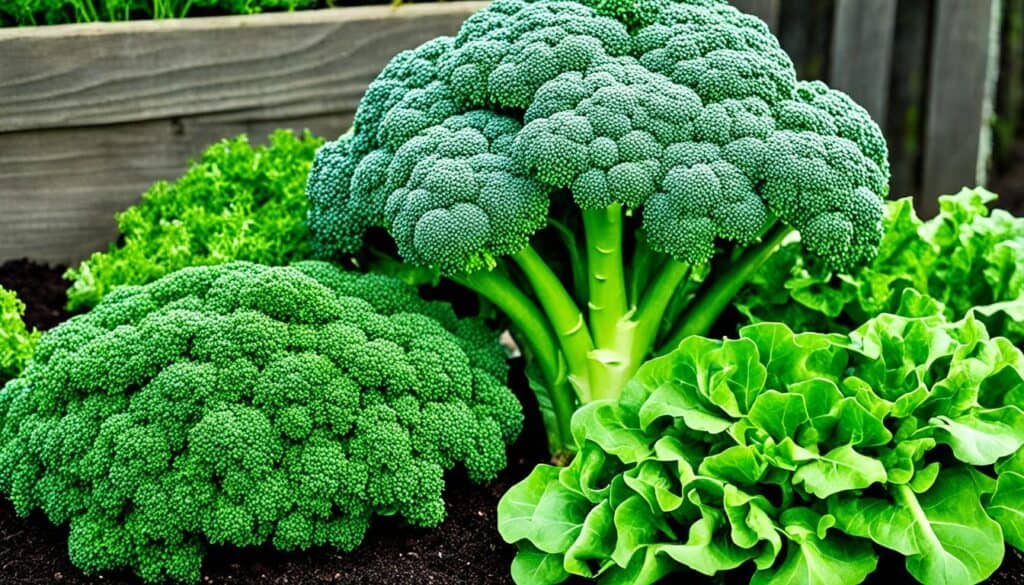
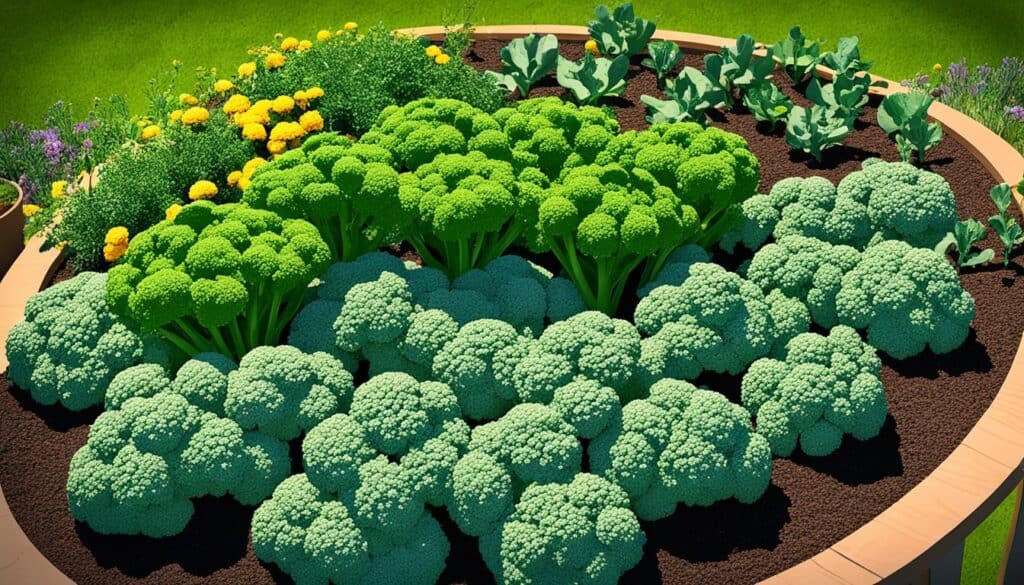

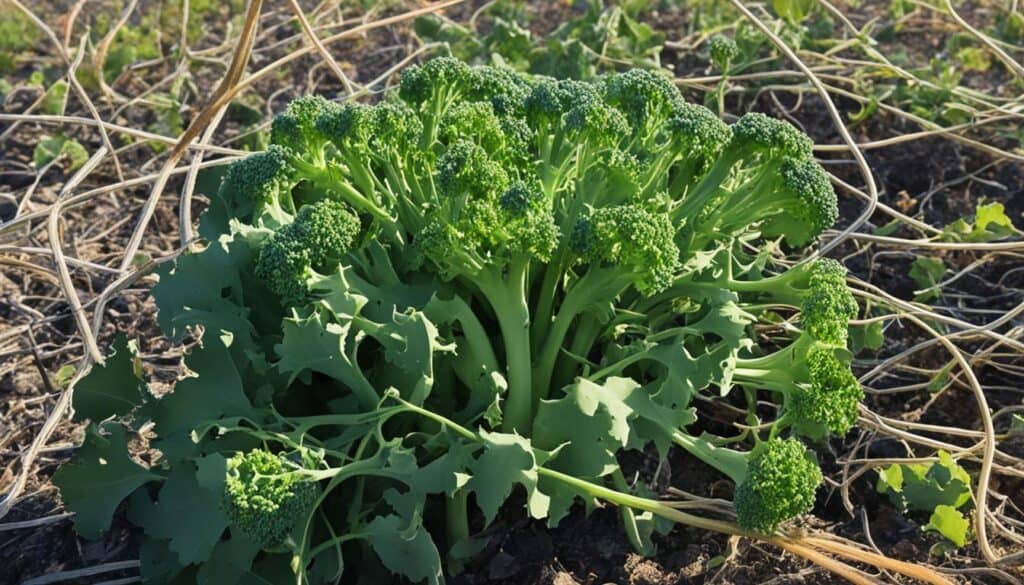
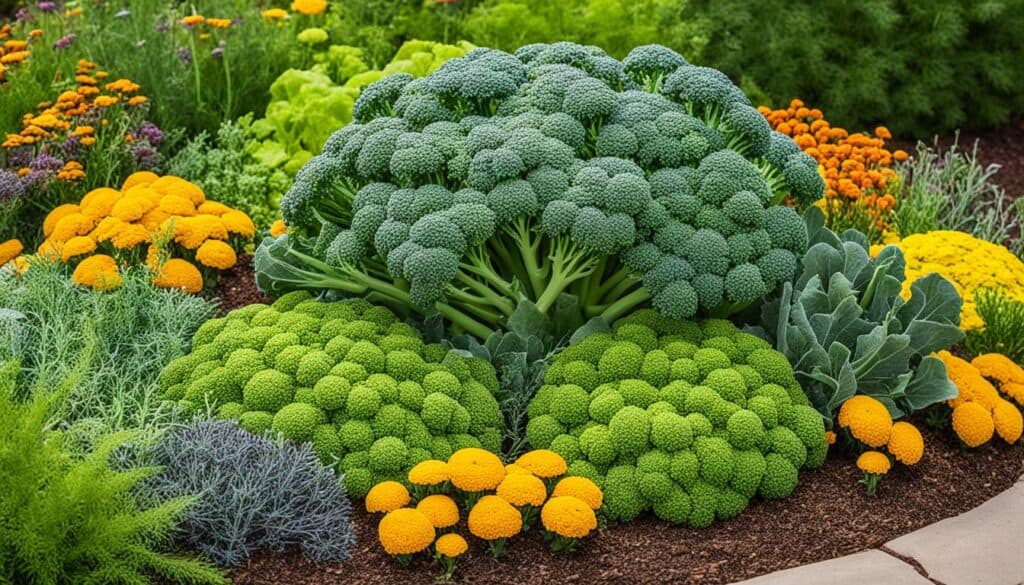



Leave a Reply